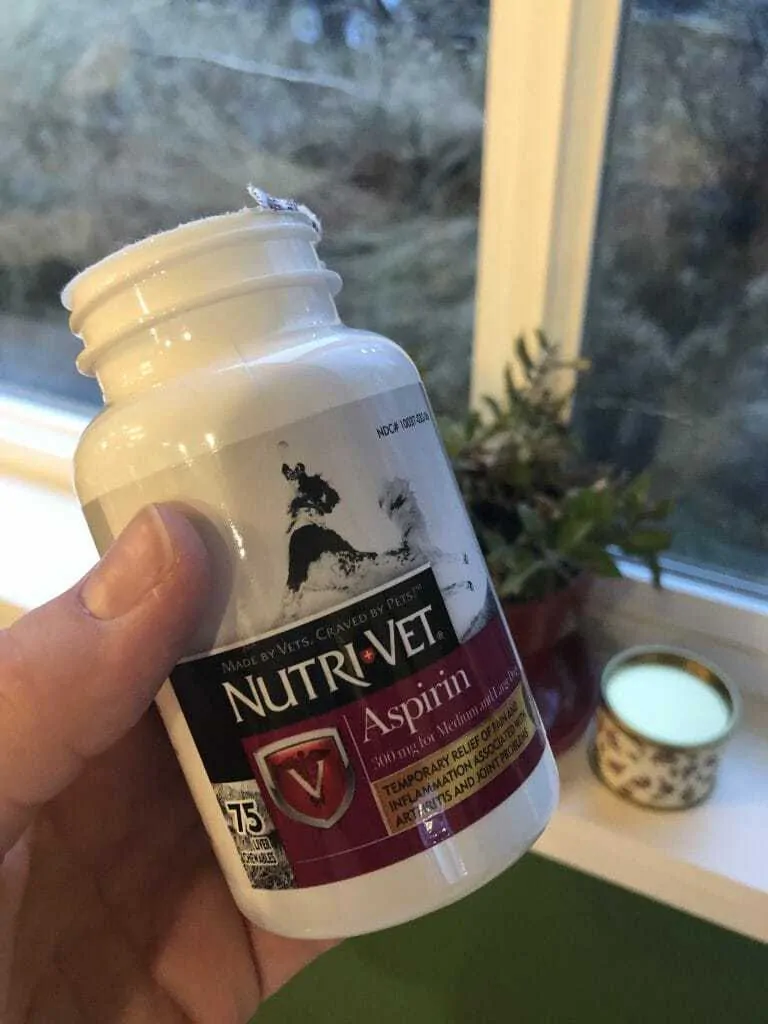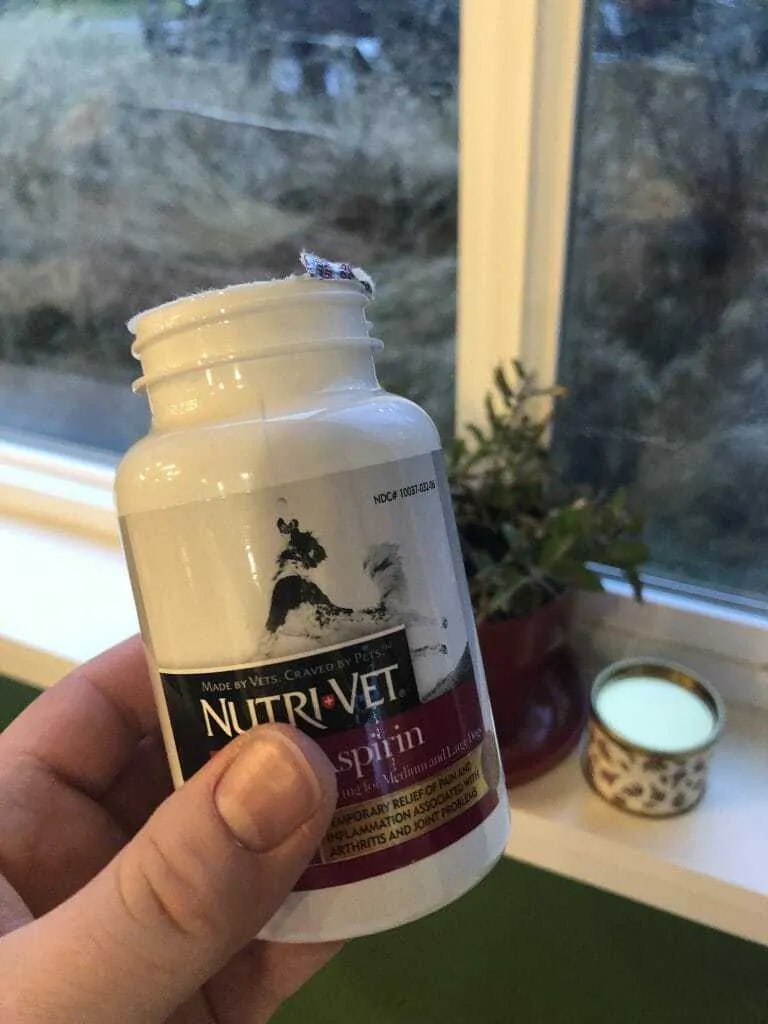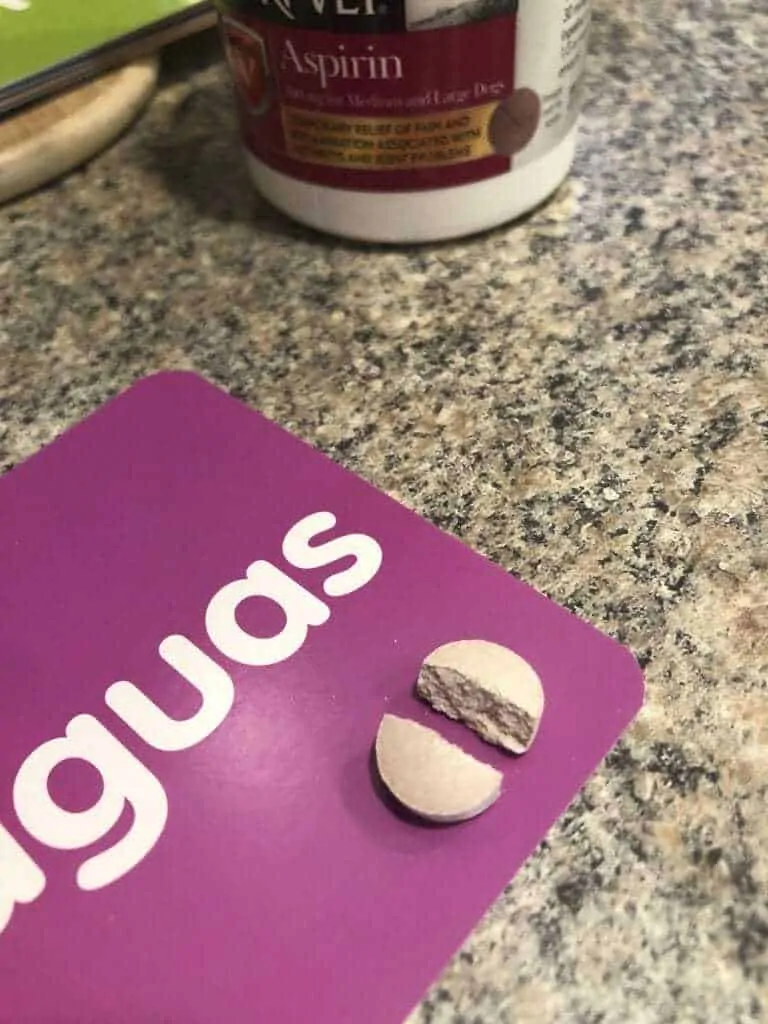There’s nothing worse than seeing your fur-baby in pain. And because they can’t explain to us how they’re feeling, we aren’t sure how, exactly, to help. Once, when my German shepherd, Bella, was about four, she howled in pain while chasing a ball. She stopped abruptly and began to limp. I ran to her, picked her up (once my baby, always my baby!) and brought her inside.
She’d had on-and-off hip issues for a year or so. No hip dysplasia, but definitely soreness following too much exercise. And Bella was unstoppable when it came to exercise!
This particular time, her pain was bad enough that she could barely walk outside to use the restroom. I made an appointment to take Bella to the vet to make sure she didn’t have any broken bones, but in the meantime, I didn’t know how to manage her pain. “Can we just give her some Tylenol or ibuprofen?” my husband asked. “Like a fraction of the amount we would take?”
“I don’t know,” I said, and boy, am I glad I looked up whether those medications are safe for dogs. Because they are NOT. Any human-intended OTC, including aspirin, ibuprofen, and acetaminophen, can kill a dog. Dogs have different metabolic systems than we do, meaning that they break down and get rid of drugs in a different way. As such, dogs have special requirements in the pain-relief department.
Aspirin and NSAIDs like ibuprofen and naproxen (Aleve) work by blocking the enzyme cyclooxygenase. This enzyme creates prostaglandins, which cause fever, pain, and inflammation. The problem is that prostaglandins also play crucial functions in the body, including regulating blood flow to the kidneys and keeping blood flowing without clotting. The dosage in human-intended NSAIDS contain far too much prostaglandin-blocking properties for a dog’s system. Signs of NSAID complications in dogs include nausea, vomiting, bloody diarrhea, kidney dysfunction, liver issues, and loss of appetite. If your dog presents any of these symptoms after accidentally taking an NSAID, take them to the nearest veterinary hospital immediately.
You can also call the 24/7 Pet Poison Helpline at 800-213-6680 for immediate advice on immediate strategies to save your dog’s life as you’re en route to a hospital, or if your dog has ingested pain medications but isn’t presenting any symptoms. Spread a towel or blanket around your dog and try to inspect any vomit or diarrhea for signs of the pills coming out. If this is too much for you, save the towels and bring them to the vet, who’s used to doing things like this and will appreciate having evidence to help assess your pup.
You might think Tylenol is a safer option because it’s not an NSAID. But if a dog eats a toxic dose of acetaminophen, the stuff wreaks havoc on their kidneys, obliterates their liver cells, and cuts off the oxygen delivery system in the blood. This causes all sorts of potentially deadly problems, so please: never give your dogs Tylenol!
When in doubt, do not reach into your cupboard for whatever’s in there to give your dog, even if you find dog-appropriate baby aspirin doses on the Internet. ONLY give your dog human-intended pain relievers under your veterinarian’s supervision, carefully following their dosage requirements. But a better option for when your dog is waiting for a vet visit? Head to the pet store or Amazon to find a pet-specific over-the-counter pain reliever.
This aspirin is manufactured especially for dogs, making it a safe choice — unlike human-intended aspirin.
We’ve rounded up our favorite OTC pet medications and pain relievers for you. Next time your dog gets achy or sprains a leg, reach for one of these.
Contents
Vet’s Best Aspirin Free Aches & Pains Chewable Tablets
Formulated especially for stiff muscles and joints, this aspirin-free formula is safe for dogs of any size. You shouldn’t give it to young puppies, though: it’s safest for dogs 10 months and older. You can even give one dose to your dog twice a day if needed! The pain-relieving ingredients in this over-the-counter pain reliever are:
- Glucosamine hydrochloride, which can help reduce inflammation in dogs. Glucosamine is also considered very safe for dogs, as it has few side effects and no known fatal side effects.
- MSM (methylsulfonylmethane), a natural analgesic (pain reliever) and anti-inflammatory.
- Bromelain, sourced from pineapple plants, works to digest proteins and promote plasmin in your dog, which helps keep tissue healthy. It’s also an anti-inflammatory agent.
- Yucca, which contains steroidal saponins, helping dogs find relief from inflammation and joint pain.
- White willow bark, which contains the aspirin-free pain reliever salicin.
This nature-based pain reliever can work really well for dogs who experience hip and joint issues even from an early age. And it’s safe, meaning you can enjoy peace of mind while giving it to your pup.
No products found.
Nutri-Vet Aspirin Chewables for Large Dogs
Sometimes, a natural aspirin-free remedy just doesn’t do the trick. What if your dog’s joint pain comes from a fall or a run-in with another dog? They may need something stronger, like aspirin for dogs. Recently, Eira wriggled out of my arms when I was transporting her into the bathtub at our local pet wash. She landed on her side, poor thing, and although she seemed fine at first, later on she started to limp a little.
So I decided to give her some Nutri-Vet Aspirin.
Eira gets ready for her aspirin dose!
Take note that this aspirin is intended for medium and large dogs over 50 pounds. Eira is about 60 pounds, but I still broke her pill in half. The one quibble I have with this tablet is that in the photo on the bottle, it appears there’s a groove in the middle of the pill to make for easy splitting.
If you look on the right side of the bottle, you can see a closeup of the chewable. There’s a line down the center that does not exist on the actual pill!
It took some effort to cut the pill in half for Eira.
The pill, cut in half.
At first I offered it to her like a treat, but she wasn’t fooled and didn’t want to eat it. So I snuck it into her food, and she gobbled it right up. You can also use a pill pocket, a specially designed treat with a hole in the center to hide the pill, or crush the pill into powder which you then spread into some delicious wet food for your dog.
Some dogs might love the taste of the tablet once they bite in: it has a nice liver flavor. Not that I’ve tasted it!
Each tablet contains 300 mg of aspirin. Even though it’s formulated for dogs, this is a pretty high amount of aspirin. If your dog is in pain, consider halving the pill for a 150-mg dose. If the pain persists, give the full amount. But follow the directions carefully and do not overdo it! Also, store the aspirin well out of reach of your dog.
Eira did well with her one dose of 150 mg. I gave it to her at the same time the following day, and on the third day she wasn’t limping anymore. I also made sure to keep her inactive during the aspirin days even though she could walk without pain. Just because she couldn’t feel the pain didn’t mean she didn’t have a minor injury!
No products found.
NaturVet Buffered Aspirin for Small Dogs
Small dogs can benefit from aspirin, too, and this is one of the safest options out there. Each pill contains 60 mg of buffered aspirin. Buffered aspirin includes an antacid to keep the stomach-upsetting side effects at bay, although your little dog should still take it with food. You can use this aspirin on small-breed dogs over the age of 6 months and it’s ideal for dogs up to 24 pounds.
No products found.
All Natural Arthritis Pain Relief for Dogs
Does your dog mainly struggle with arthritis-related pain? You may not want to give her aspirin on a long-term basis if that’s the case, as it can still be hard on a dog’s system to work aspirin through every single day. Instead, you can save the aspirin for the really tough days and look to K9 Nature Supplements’ All Natural Arthritis Pain Relief for Dogs. These tasty soft chews go down easy, and they contain three natural active ingredients:
- Willow bark extract, that natural pain reliever we also saw in Vet’s Best Aspirin-Free Chewables for dogs.
- Cat’s claw root extract, an anti-inflammatory that’s been used for pain for decades.
- Fish oil, which contains essential fatty acids to promote arthritic pain relief.
Giving this pain reliever to your dog regularly can greatly improve arthritis symptoms!
No products found.
If you want to try something other than a tablet, it’s worth giving CBD oil a try for pain, too. Check out our CBD oil article for more information on the pain-relieving and anti-inflammatory benefits of CBD.

Laura Ojeda Melchor grew up with two beloved German shepherd dogs—Clancy and her daughter, Bella. From the time her family brought Clancy home, Laura took on the duty of pooper-scooper and potty trainer. As a teenager Laura helped her mother care for Clancy during her pregnancy. She still remembers fondly the exciting, frigid winter night when the seven special puppies were born. Laura kept the youngest puppy—Bella—and potty trained her, too. She taught Bella important commands, took her for long walks, and spent hours throwing tennis balls for her.
In November, Laura brought home a sweet new puppy, Eira Violet. Eira is half Alaskan malamute and half German shepherd, and Laura loves her deeply. She chose not to use a crate to potty train Eira and was pleasantly surprised at the results. She now has a sweet, energetic dog who always uses the potty outside, plays well with Laura’s toddler, and enjoys long family walks in beautiful Alaska. If you were to meet Eira, she’d bound up to you with a wagging tail and get you running around the yard with her in no time.




